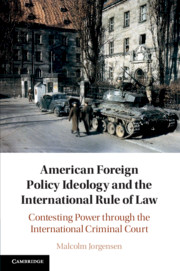Refine search
Actions for selected content:
2 results
2 - The Structure of American Foreign Policy Ideology
- from Part I - Ideology in American International Law Policy
-
- Book:
- American Foreign Policy Ideology and the International Rule of Law
- Published online:
- 12 December 2019
- Print publication:
- 02 January 2020, pp 50-78
-
- Chapter
-
- You have access
- Open access
- HTML
- Export citation

American Foreign Policy Ideology and the International Rule of Law
- Contesting Power through the International Criminal Court
-
- Published online:
- 12 December 2019
- Print publication:
- 02 January 2020
-
- Book
-
- You have access
- Open access
- Export citation
